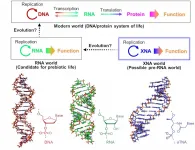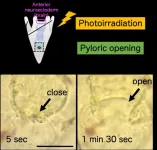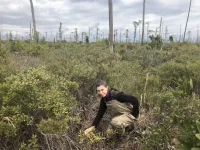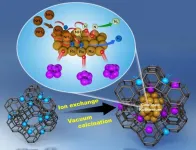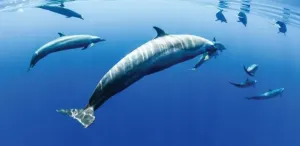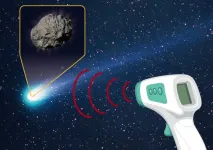Aquatic biodiversity key to sustainable, nutrient-rich diets
2021-04-06
(Press-News.org) Seafood is a pillar of global food security--long recognized for its protein content. But research is highlighting a critical new link between the biodiversity of aquatic ecosystems and the micronutrient-rich seafood diets that help combat micronutrient deficiencies, or 'hidden hunger', in vulnerable populations.
"Getting the most nutritional value per gram of seafood is crucial in fighting hidden hunger and meeting United Nations Sustainable Development Goals," says Dr. Joey Bernhardt, an ecologist from the University of British Columbia (UBC) who led the study, published this week in the Proceedings of the National Academy of Sciences.
"We've found that aquatic species contain distinct and complementary sets of micronutrients, so the most efficient way to fulfill our nutritional requirements is to fill our diets with small amounts of a variety of species. In order to be able to do that, we need to preserve the biodiversity of our aquatic ecosystems locally and globally."
Dr. Bernhardt and UBC biodiversity researcher Dr. Mary O'Connor analyzed nutrient concentrations in the edible portions of 547 aquatic finfish and shellfish species. While different animals offered similar amounts of protein, they varied greatly in concentrations of micronutrients like iron, zinc, calcium and two fatty acids (docosahexaenoic and eicosapentaenoic acid, known as DHA and EPA). This variation is critical to the value of biodiversity to human well-being.
Most animals did not meet a single micronutrient recommended dietary allowance (RDA) in a 100g portion--fewer than half reached a target of 10% RDA for calcium, iron and EPA. Increasing biodiversity from one to 10 species in seafood diets was correlated with reaching more nutrient targets established by the US Institute of Medicine--and the nutritional value increased even when the seafood portion size remained constant.
"We know that biodiversity is a critical component of the many economic, cultural and ecological benefits humans enjoy from healthy natural ecosystems--from elevated forest production to water quality to nutrient cycling. Our analysis proves that biodiversity also enhances nutritional metrics in aquatic systems, and this benefit is at least as great as the biodiversity benefits we've seen in other sectors," says Dr. O'Connor.
"And this study further demonstrates the importance of biodiversity, measured as the number of different kinds of animals out there, for human-wellbeing in wild ecosystems--showing that protecting biodiversity in nature is as important as maintaining agro-biodiversity."
The finding is of particular importance coastal communities, including many Indigenous communities, who eat on average 15 times more seafood than other groups--and tend to rely more on locally available seafood.
"Aquatic ecosystems are under threat from human activities, and we're observing major changes in biodiversity patterns worldwide," adds Dr. Bernhardt.
"Until now, we didn't understand the consequences of these aquatic biodiversity changes for human nutrition and health. With this new work, we have bridged the gap between biodiversity science and human nutrition science, demonstrating that aquatic biodiversity change can have direct and immediate impact on human nutrition and well-being."
INFORMATION:
[Attachments] See images for this press release:
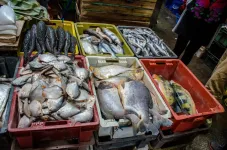
ELSE PRESS RELEASES FROM THIS DATE:
2021-04-06
Nagoya University scientists in Japan have demonstrated how DNA-like molecules could have come together as a precursor to the origins of life. The findings, published in the journal Nature Communications, not only suggest how life might have begun, but also have implications for the development of artificial life and biotechnology applications.
"The RNA world is widely thought to be a stage in the origin of life," says Nagoya University biomolecular engineer Keiji Murayama. "Before this stage, the pre-RNA world may have been based on molecules called xeno nucleic acids ...
2021-04-06
Tsukuba, Japan - Many life forms use light as an important biological signal, including animals with visual and non-visual systems. But now, researchers from Japan have found that neuronal cells may have initially evolved to regulate digestion according to light information.
In a study published this month in BMC Biology, researchers from the University of Tsukuba have revealed that sea urchins use light to regulate the opening and closing of the pylorus, which is an important component of the digestive tract.
Light-dependent systems often rely on the activity of proteins in the Opsin family, and these are found across the animal kingdom, including in organisms with visual and non-visual systems. Understanding ...
2021-04-06
LOS ANGELES (April 5, 2021) -- New research from the Smidt Heart Institute shows that more patients--specifically those with medical risk factors or from underserved communities--opted into telehealth appointments for their cardiovascular care during the COVID-19 pandemic. The data also suggests these telehealth patients underwent fewer diagnostic tests and received fewer medications than patients who saw their doctors in person.
The findings, published in JAMA (Journal of the American Medical Association) Network Open, point to "digital shifts" in cardiovascular care amid the ongoing COVID-19 pandemic.
"We were encouraged to learn that access to cardiovascular ...
2021-04-06
DURHAM, N.C. -- Emily Ury remembers the first time she saw them. She was heading east from Columbia, North Carolina, on the flat, low-lying stretch of U.S. Highway 64 toward the Outer Banks. Sticking out of the marsh on one side of the road were not one but hundreds dead trees and stumps, the relic of a once-healthy forest that had been overrun by the inland creep of seawater.
"I was like, 'Whoa.' No leaves; no branches. The trees were literally just trunks. As far as the eye could see," said Ury, who recently earned a biology Ph.D. at Duke University working with professors Emily Bernhardt and Justin Wright.
In bottomlands throughout the U.S. East ...
2021-04-06
Tsukuba, Japan - With a prevalence of about one in 10 people worldwide, chronic kidney disease (CKD) is a global health problem. It also often goes undetected, leading to a range of negative health outcomes, including death. Catching it at an early stage and adjusting nutrition and lifestyle can improve and extend life, but only if there are economically feasible systems in place to promote and educate on this.
Amid finite health-care resources, any CKD intervention must be both practical and cost-effective. A team of researchers centered at the University of Tsukuba now believe they have found a CKD behavioral intervention that can be delivered at a reasonable cost. They published their findings in the Journal of Renal Nutrition.
Changing eating and lifestyle habits, and ...
2021-04-06
For the implementation of the effective hydrogen economy in the forthcoming years, hydrogen produced from sources like coal and petroleum must be transported from its production sites to the end user often over long distances and to achieve successful hydrogen trade between countries. Drs. Hyuntae Sohn and Changwon Yoon and their team at the Center for Hydrogen-fuel Cell Research of the Korea Institute of Science and Technology (KIST) have announced a novel nanometal catalyst, constituting 60% less *ruthenium (Ru), an expensive precious metal used to extract hydrogen via ammonia decomposition.
*Ruthenium is a metal with the atomic number 44, and is a hard, expensive, silvery-white member of the platinum group of elements.
Ammonia has recently emerged as a liquid storage and transport ...
2021-04-06
Epidemiological studies have found that transportation noise increases the risk of cardiovascular morbidity and mortality, with high-quality evidence for ischaemic heart disease. According to the WHO, ?1.6 million healthy life-years are lost annually from traffic-related noise in Western Europe. Traffic noise at night causes fragmentation and shortening of sleep, elevation of stress hormone levels, and increased oxidative stress in the vasculature and the brain. These factors can promote vascular dysfunction, inflammation and hypertension, thereby elevating the risk of cardiovascular ...
2021-04-06
Humans have altered the ocean soundscape by drowning out natural noises relied upon by many marine animals, from shrimp to sharks.
Sound travels fast and far in water, and sea creatures use sound to communicate, navigate, hunt, hide and mate. Since the industrial revolution, humans have introduced their own underwater cacophony from shipping vessels, seismic surveys searching for oil and gas, sonar mapping of the ocean floor, coastal construction and wind farms. Global warming could further alter the ocean soundscape as the melting Arctic opens up more ...
2021-04-06
The world's first ground-based observations of the bare nucleus of a comet nearing the end of its active life revealed that the nucleus has a diameter of 800 meters and is covered with large grains of phyllosilicate; on Earth large grains of phyllosilicate are commonly available as talcum powder. This discovery provides clues to piece together the history of how this comet evolved into its current burnt-out state.
Comet nuclei are difficult to observe because when they enter the inner Solar System, where they are easy to observe from Earth, they heat up and release gas and dust which ...
2021-04-06
April 06, 2020-- A new commentary published online in the Annals of the American Thoracic Society provides an exhaustive examination of published research that discusses whether air pollution may be linked to worse COVID-19 outcomes. The studies that the authors examined look at several potential disease mechanisms, and also at the relationship between pollution, respiratory viruses and health disparities.
In "COVID-19 Pandemic: A Wake-Up Call for Clean Air," Stephen Andrew Mein, MD, Department of Medicine, Beth Israel Deaconess Medical Center, Boston, and colleagues ...
LAST 30 PRESS RELEASES:
[Press-News.org] Aquatic biodiversity key to sustainable, nutrient-rich diets

